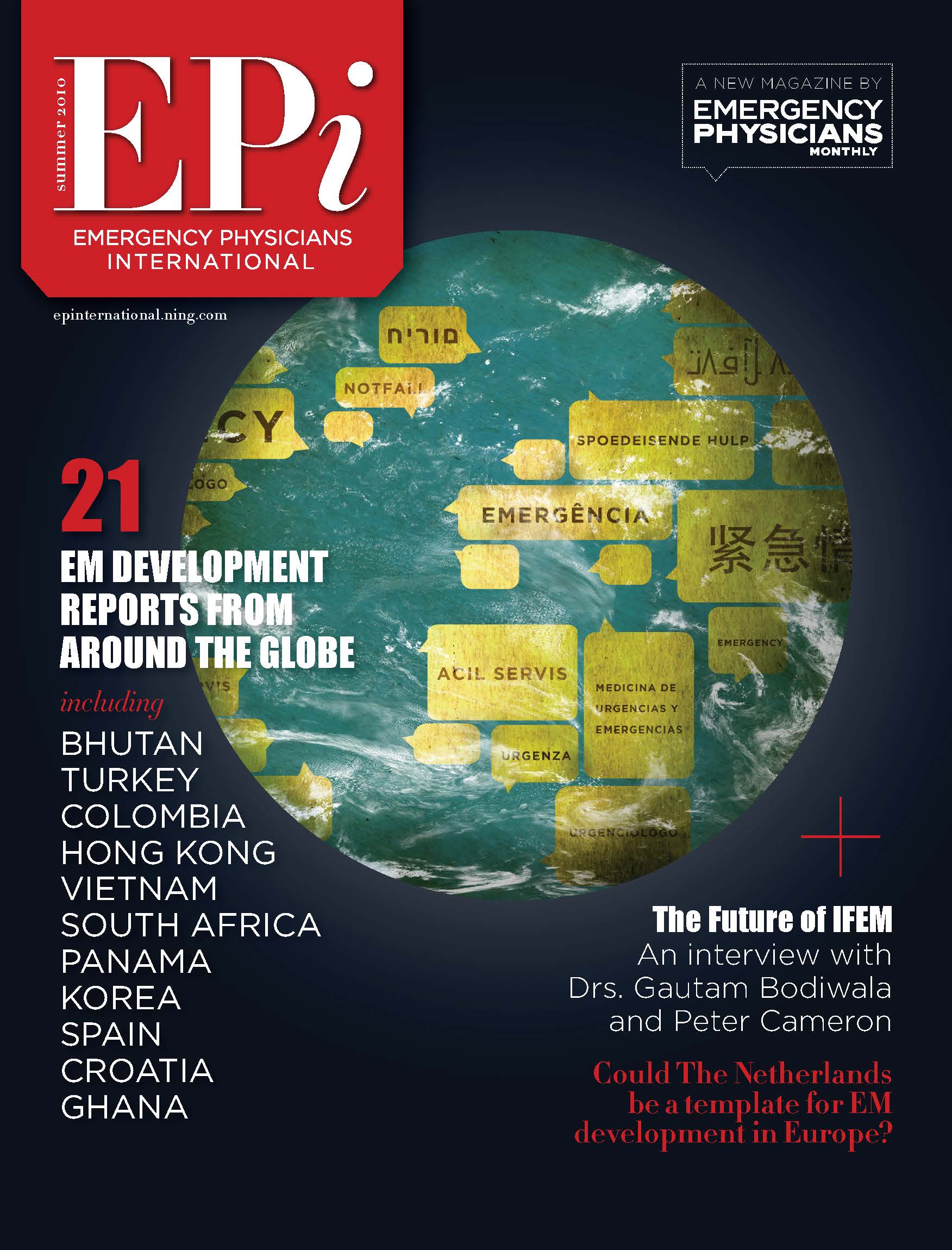Economies, Ecologies, and Emergencies: The Physician’s Dilemma
The climate crisis has presented itself in global temperature rises, intense heat waves and freezes, rising sea levels and droughts, and a number of other significant markers. According to Health Affairs, “climate change is not an imperceptible environmental process, but a bona fide public health crisis in the making.” It is also expected to continue having profound impacts on economic infrastructures by shaping supply chains, and by damaging industries from agriculture to tourism, per a 2018 study. To learn more about the intersection of ecological studies, economic needs, and emergency medicine, I interviewed Dr. N. Stuart Harris, Director of the Massachusetts General Hospital Wilderness Medicine Fellowship.
Dr. Harris was quick to clarify that we have plenty of evidence for this evolving catastrophe right now. The numbers are telling stories as best they can. We do not need more science, any more than we need "more science" to prove that cigarettes are bad for you. What we need now is education and action on the abundant data we have. It is easy for the intersection of climate change and healthcare to feel abstract when it’s a beautiful day with clear skies, or at your sink with a faucet providing abundant clean water. However, these individual moments of beauty do not negate the impending chaos that has already begun. Here, the physician’s role becomes “storyteller,” to make the impacts of climate change accessible to people, through an explanation of what it means for each and every one of our bodies. As Harris mentioned:
“A lot of people do not really care about climate change -- it feels impossibly distant if you are talking about how many degrees the planet is going to warm up over 50 years. Our species tends not to be provoked to act on threats that appear distant... If instead the medical community focuses on the immediate health impacts caused by the burning of fossil fuels, the public and policy makers have an easier time creating needed change. Decarbonization is a critical health need now, independent of climate change. If we make people aware that right now and on a daily basis the burning of fossil fuels causes their kids to have asthma flares and adults to have acute heart and lung disease that will present to your ED today, they are much more likely to act. This is a health emergency right now. That grabs people's attention. In addition, climate warming is creating immediate heat stress injuries, and bringing more pollen and insects and diseases. I think it is our moral and professional responsibility as physicians to make clear that this is not a problem down the road. It's not about ‘the environment.’ It's about us. Our patients, their kids, their parents, and their health.”
At this point, the question turns from whether we should respond, to how we prevent the crisis from becoming an impossible situation. Harris offered commentary on how too often, the first instinct is to apply an economic lens. He clarified how we need to shift this assessment to recognize fundamental biological realities:
“It isn’t coincidence that ecology and economy share the same Greek root for ‘home.’ They are both critical. Where we are courting disaster is in not recognizing that humanity and the entirety of our GDP is an ecological phenomena -- not vice versa. We exist only as part of a vast, interconnected web of life. The entirety of our GDP is derived from a functioning biosphere -- our shared ecology. As we approach and exceed the carrying capacity of the planet, our assumptions that protecting our environment comes ‘at a cost to the GDP’ will increasingly be revealed for what it is -- a tragic vestigial assumption dating from historic times before human demands exceeded the biosphere’s capacity to indulge us. All human activities depend on the planet’s living systems functioning to the point that they can support us. We can have the highest GDP in the world, but if we don't have water, if we don't have all the things that we take for granted (the environment, food and everything else that supports our existence) then material economies fall apart and the world [will] keep going without us.”
A key point in what this means for healthcare is that much of healthcare practice is already based on environment and ecology. The way to treat the same injury at a campsite and in an urban area differ significantly based on resources available, from individual needs to the presence of clean water and a bed to lie on. Per Harris’ example, as homes are flooding due to rising sea levels, the meaning of climate change shifts from a general climate crisis, to a series of specific urban crises as resource limitations cause the Emergency Departments of our most sprawling cities to respond to medical emergencies in a limited manner now confined to the wilderness. Harris went on to explain what this can look like in action:
“Changes to the biosphere have immediate impact [for example,] by decreasing our carbon use. Let's use gasoline, diesel, and coal. Since the pandemic, we're accomplishing very real and immediate health outcomes, fewer miles driven and less carbon released into the atmosphere is important but also, it has immediate impact. We have less particulate matter injected into the immediate surrounding community. With that comes change in incidence of asthma, lung disease, heart disease, and cancer. If you're exposed to pollution for years, we’ve known of the bad health impacts, but we’re increasingly finding that the heart and blood respond to environmental pollution within hours to days-- very, very rapidly. So, as the commuting habits and traffic patterns have decreased, there's been some mapping to show that we're seeing real impacts, positive impacts in the local communities surrounding big roads. Efforts to decarbonize our economies aren’t to save the planet a long time from now, but to protect human health in the immediate term. [When we consider ecology], we have immediate impacts on human health.”
Despite the successes visible through ecological lenses, there is a perceived tension with economic pressures. The US healthcare system produces about 10% of the nation’s carbon emissions. Like most significant economic influences, the US healthcare industry creates a significant amount of solid waste (almost 7,000 tons per day). Each one of the causes for waste, whether disposable rubber gloves, face masks, testing kits, and anything in between, is also an industry in itself. When combined with the for-profit nature of US healthcare, the industry makes up just under 18% of the United States’ economy,
Dr. Harris was careful to outline how right now in medicine, especially in Emergency Medicine, there is a huge focus on efficiency, commonly tied to business frameworks. With a booming global market, medical organizations rely on complicated delivery systems which provide just enough to get by each day. This fragile set up has become the standard because it allows hospitals to maximize their use of space, by never having more than is needed. It also keeps economies running by guaranteeing a constant need for services such as delivery truck companies, which could become obsolete with more localized supply chains. Healthcare in the United States is “big business,” which places value on treatment-related profits rather than on preventative, patient-centered care. Reforming it to honor the ecological needs the climate crisis presents would require deconstructing this understanding of care, and placing the focus on creating positive circumstances for people to lead healthy lives, rather than just on responding to sickness as it occurs.
These issues coincide in the slim operational margins of the US healthcare system. Dr. Harris outlined how climate change will inhibit access to resources and create sharp declines in the ability to provide quality care. If a boat blocking the Suez Canal could freeze 10% of global trade, the increases in flooding, hurricanes, wildfires, etc., have done and will continue to do much worse. Harris referenced previous natural disasters when he discussed how “when a hurricane slams into Puerto Rico and disrupts the manufacturing capacity for medical devices, fluid bags and medications, that has a direct impact on my ability to care for patients in Boston or Seattle.” He then expanded into what this perfect storm can look like long-term:
“If you have increasing weather disruptions due to climate change, the systems that we have designed, we're going to have to rethink. We need to be more prepared to be resilient and to be redundant. Right now, those systems are focused on efficiency rather than on resilience. It's great to have a super efficient system if you've got a super stable environment. But that same ability to be hyper efficient within a very narrow range of environmental conditions could be a real deficit. And we [saw this] in the pandemic supply chains with PPE. Having the ability to source from different locations might be a little bit less efficient, but it ultimately provides a safety net, which is critical to allowing us to provide your care.”
As a result of this need to shift from efficiency to a more robust resilience, there is room to address economies and ecologies together, in a way that emphasizes emergency care needs. Given the choice between preventative care like seatbelts and a world-class trauma center to treat survivors hurled through the windshield during a car crash, Dr. Harris suggests that this is our chance to choose the seatbelts. He emphasized how we need to think of healthcare not as an isolated industry, nor as a business with solely economic value. It is time to think of healthcare as one reflection of the world’s ecological needs, and create a reciprocal relationship with the Earth to provide the best, most sustainable care possible. As a final note, Harris beautifully outlined physicians’ roles in this undeniably important work not just as caretakers, but as storytellers:
“[This work is] at the bedside with an individual patient and the fact that they live next to an interstate, next to an industrial site that's polluting and making them aware of the direct impact of that proximity to pollution on their health. [Part of our role is] to help them become political in a way that protects their interests. It can be one patient at a time. It needs to be. There can also be medical voices nationally and internationally, to help people to be aware. Physicians have a tremendous capacity to influence change, if we engage. And part of being engaged is recognizing forces and then being willing to say that this is a medical process. Climate change and de-carbonization, these are medical, ethical concerns because we're hurting our patient population. If we're charged with protecting human health and creating good health conditions, this is pretty low hanging fruit. This isn't something that's driven by either side of the political spectrum. It’s our professional responsibility. We need to be doing a better job of advocating for systems that will allow our patients to thrive.”







